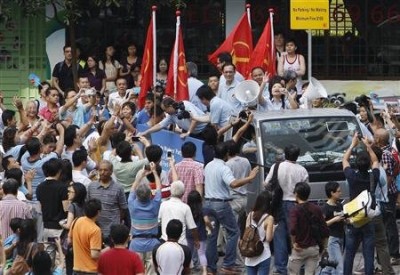Singapore’s ruling People’s Action Party (PAP) government has lost two by-elections in eight months – one in Hougang on 26 May 2012, and most recently in Punggol East on 26 January 2013 to the Worker’s Party (WP). Some commentators describe the losses as symptoms of a sea change in Singapore politics, and some predict more PAP losses in future elections. Supporters of the PAP government, however, remain optimistic that the ruling party can reinvent itself before the next general elections due in 2016.
In his classic work, Voice, Exit and Loyalty (1970), Albert O. Hirschman combines economic principles and political science by analysing voice and exit as mechanisms for improving the quality of products in an economy or governance in a state. He defines the giving of feedback as voice and the choice of turning to a substitute brand or product as exit. Loyalty, according to Hirschman, is a “less rational, though far from wholly irrational” concept when analysing the response of dissatisfied customers of a company or disgruntled voters in a country. From the two by-election defeats suffered by the PAP, voters in Singapore have taken the exit option by choosing an alternative candidate over the PAP.
To be sure, there are many factors that account for the loss of the Hougang and Punggol East seats by the PAP to the WP. Perhaps the WP candidates, Png Eng Huat and Lee Li Lian, connected better with residents in Hougang and Punggol East, respectively. It could also be the popularity of WP as an alternative political party to the PAP. Some opine that both PAP by-election losses were attributed to a broader discontentment with the government’s policies related to immigration, housing, and transportation. But without comprehensive studies and strong data, it is hard to be sure what the reasons are, and even harder to resist the trend.
Between exit and voice, the ruling party clearly chooses voice as a mechanism to improve its quality of governance. The PAP must listen, or at least be perceived to be listening, to the voices of the people. Soon after the general elections of 2011 (GE2011), the PAP government embarked on a structured approach to gather feedback from cross-sections of the population through the “Our Singapore Conversation” (OSC) project. The prime minister, Lee Hsien Loong, and other ministers were featured on forums broadcasted on national television in English and Chinese channels, apparently to demonstrate sincerity in listening to the voices of the people. The OSC has drawn more criticisms than applause because of the composition of the committee reflecting the glaring absence of participants from other political parties.
Prime Minister Lee has also started his own Facebook page where he attempts to engage the section of Singapore’s population that actively plugs in to social media. Unlike the use of traditional media such as television and newspapers, PM Lee’s Facebook posts attract mostly encouraging comments. It may well be a sign that the prime minister is making some headway in engaging the people through Facebook.
Despite its ostensible goals, OSC falls short of Hirschman’s definition of voice. The voice in the OSC lacks the spontaneity in most democratic societies where civil rights are respected and protected. Without the freedom to speak up openly on issues deemed to be unjust, Hirschman argues that “dissatisfaction is more likely to take the form of silent exit”.
There are at least two ways that Singaporeans can choose exit over voice. Elections remain a legitimate and effective means to shift allegiance from the PAP to opposition parties. Another form of silent exit comes in the form of migrating overseas. The number of Singaporeans giving up citizenship hovers around 1,200 annually since 2007, and the number of Singaporeans currently residing overseas is approximately 200,000 based on the newly-released Population White Paper.
The PAP government now struggles to create a positive trajectory in guarding PAP votes and retaining Singapore’s best and brightest talents. When weighing the costs of exit, exiting citizens must reckon that the greatest loss is their right as citizens to participate as members of the society to have a voice. Yet since the PAP government has successfully curtailed freedom of speech and public demonstrations, more Singaporeans may pack and leave the country for good.
There is a third group: the PAP loyalists. They, too, may not be fully satisfied with the government’s policies. They remain loyal, however, because they are hopeful that the PAP will deliver on its promises and hold the belief that if they preserve their right to a voice, no matter how small that voice may be, they will eventually be heard. To be sure, the GE2011 results indicate that majority of Singaporeans voted for the PAP. They are the ones putting up “Likes” and supportive comments on the Facebook pages of PAP MPs. But this group looks set to shrink very quickly. To reverse the downward trend, the PAP will have to fight GE2016 on two fronts: One, to retain the support of the loyalists with continuance of policies that worked well in the past; two, to convince the Singaporeans on the threshold of exiting that they have a voice.
Daniel Wei Boon Chua is a PhD Candidate at the College of Asia and the Pacific, Australian National University.
 Facebook
Facebook  Twitter
Twitter  Soundcloud
Soundcloud  Youtube
Youtube  Rss
Rss 